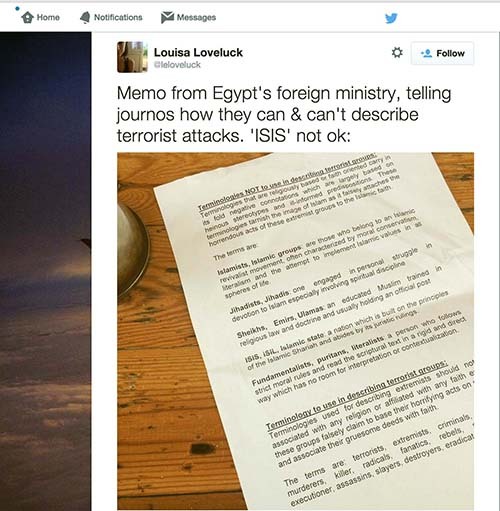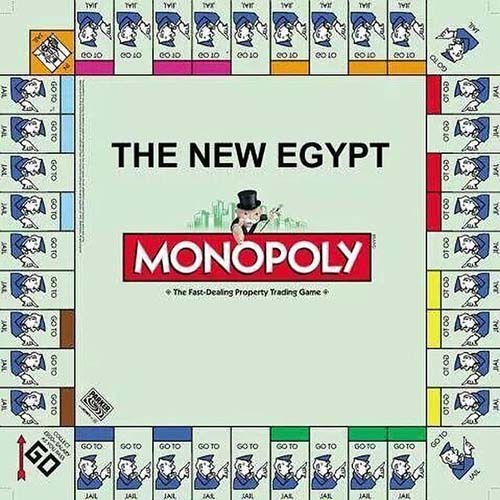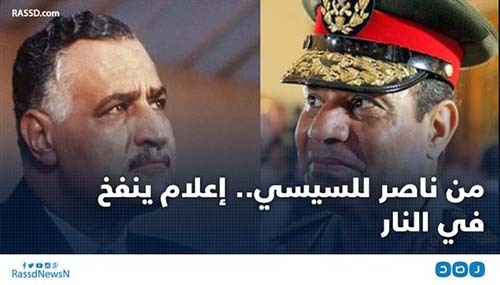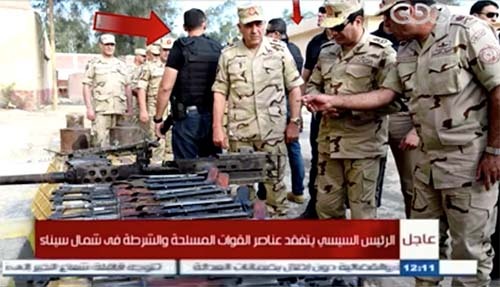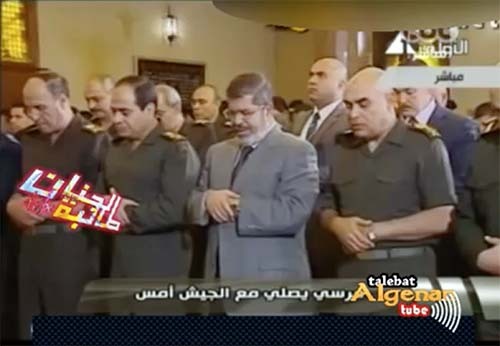One can't blame journalists in Egypt for being confused about what they can (and can't) cover and what language to use in their reports, given the widening chasm between authorities and countless news organizations.
Local and foreign journalists could face prosecution and jail if they fall afoul of anti-terrorism legislation to be passed shortly that bars them from publishing news deviating from the official version of terrorist-related events.
Louisa Loveluck, Cairo correspondent for Britain's The Telegraph, tweeted about a memo from the Egyptian Foreign Ministry saying it wasn't OK to use the term ISIS to describe the group currently terrorizing much of the Arab world, and beyond.
Under the new rules, journalists are told not to use the terms "Islamists, Islamic groups, jihadists, jihadis, sheikhs, emirs, ulamas, ISIS, ISIL, Islamic State, fundamentalists, puritans and literalists."
Why?
"Terminologies that are religiously based or faith oriented carry in its fold negative connotations which are largely based on heinous stereotypes and ill-informed predispositions. These terminologies tarnish the image of Islam as it falsely attaches the horrendous acts of these extremist groups to the Islamic faith," the memo said.
Instead, journalists are urged to use "terrorists, extremists, criminals, murderers, killers, radicals, fanatics, rebels, executioner, assassins, slayers, destroyers," to name a few.
"The draft law has ruffled feathers among an Egyptian press which often now marches in lockstep with the government, giving favourable coverage to aspects of a sweeping crackdown that has seen tens of thousands of people -- including journalists -- arrested over a two-year period," Loveluck wrote.
This and a meeting Saturday between Foreign Minister Sameh Shurky and representatives of foreign media in Egypt come in the wake of the recent assassination of Egyptian Prosecutor General Hisham Barakat, attacks on Egyptian troops in the Sinai, and an escalating battle between security forces and various hardline Islamist opposition groups.
According to a ministry spokesman, Shukry expressed his surprise at the foreign media's rush to publish inaccurate figures and statistics on the numbers of fallen Egyptian forces as well as their use of wrong terms in describing events in the Sinai as an "insurrection" or "revolt," which the minister rejected.
The draft law, journalists and media experts say, is a violation of the country's constitution.
Khaled Dawoud, assistant editor-in-chief of Al Ahram Weekly said in a tweet the Journalists' Union was to hold an emergency meeting to protest the draft anti-terror law that would result in the incarceration for two years of any journalist who contradicts official statements.
To which responded Rasha Abdulla, media professor at the American University in Cairo, that "the legislation would eliminate the journalism profession and turn it into mere propaganda. Anyone who dares say other than what the government dictates would be jailed."
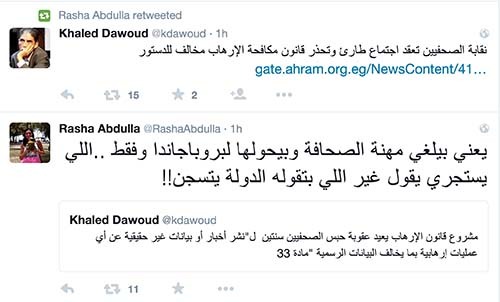
Screen shot of Khaled Dawoud and Rasha Abdulla tweets
Critics of President Abdel Fattah Al-Sisi, that include Islamists, activists, bloggers and others, point to harsher-than-usual dealings with non-compliant media.
The measures prompted someone to design an Egyptian version of the Monopoly board game on which all the property spaces require players to go to jail.
A website linked to the discredited Moslem Brotherhood equated Al-Sisi with the late president Gamal Abdel Nasser, an officer who participated in the revolution that overthrew King Farouk in 1952 and who also cracked down on the movement during his tenure.
It posted two pictures of the former and current presidents with a caption that read: "From Nasser to Sisi, media fan the flames."
Al-Sisi donned his military attire to visit troops in the Sinai following the recent attacks, drawing even more derision from detractors who recalled how he had to shed the uniform before being elected president.
Pranksters seeking to discredit CBC TV Egypt talk show host Lamis Hadidi, noted for her strong support of Al-Sisi, uploaded a fake video of her purportedly criticizing the president and his phalanx of bodyguards, asking why he needed so many armed men to protect him and whether he was afraid to be surrounded by the army.
But at the 26th second of the clip, a graphic appears very briefly under the channel's logo saying the video is a phony.
In the real video, Lamis Hadidi asked then president Mohamad Morsi, shown praying at a mosque, if he feared the military personnel flanking him, notably Al-Sisi, who served as defense minister before ousting the Moslem Brotherhood head of state.
The Brotherhood has long been banned or deemed a terrorist organization. Abdel Nasser pitted the Brotherhood against Egypt's communists and cracked a whip against both.
Last year, Ethical Journalism Network head Aidan White sounded an alarm about Egypt's war on terror threatening independent journalism.
"Almost all of the country's media - state-owned and private - have been vigorous supporters of the government's hardline anti-terror stance, a position which has raised concerns about levels of newsroom independence as Islamist opposition voices have been isolated and removed from mainstream journalism," he wrote.
In a September 2014 address before the United Nations General Assembly, Al-Sisi said his "new Egypt" would "guarantee freedom of speech."

